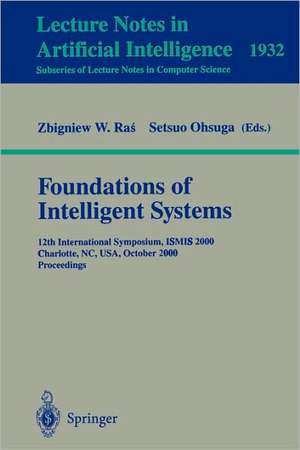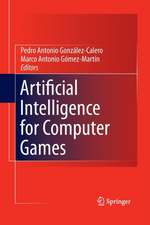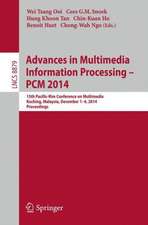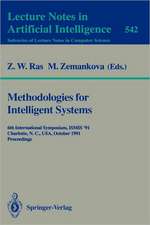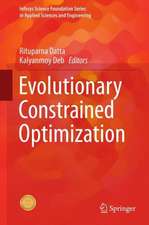Foundations of Intelligent Systems: 9th International Symposium, ISMIS'96, Zakopane, Poland, June (9-13), 1996. Proceedings: Lecture Notes in Computer Science, cartea 1079
Editat de Zbigniew W. Ras, Maciek Michalewiczen Limba Engleză Paperback – 15 mai 1996
The 53 revised full papers presented were selected from a total of 124 submissions; also included are 10 invited papers by leading experts surveying the state of the art in the area. The volume covers the following areas: approximate reasoning, evolutionary computation, intelligent information systems, knowledge representation and integration, learning and knowledge discovery, and AI logics.
Din seria Lecture Notes in Computer Science
- 20%
 Preț: 1061.55 lei
Preț: 1061.55 lei - 20%
 Preț: 307.71 lei
Preț: 307.71 lei - 20%
 Preț: 438.69 lei
Preț: 438.69 lei - 20%
 Preț: 579.30 lei
Preț: 579.30 lei -
 Preț: 410.88 lei
Preț: 410.88 lei - 17%
 Preț: 427.22 lei
Preț: 427.22 lei - 20%
 Preț: 596.46 lei
Preț: 596.46 lei - 15%
 Preț: 448.04 lei
Preț: 448.04 lei - 20%
 Preț: 353.50 lei
Preț: 353.50 lei -
 Preț: 389.49 lei
Preț: 389.49 lei - 20%
 Preț: 309.90 lei
Preț: 309.90 lei - 20%
 Preț: 645.28 lei
Preț: 645.28 lei - 20%
 Preț: 763.23 lei
Preț: 763.23 lei - 15%
 Preț: 580.46 lei
Preț: 580.46 lei - 20%
 Preț: 310.28 lei
Preț: 310.28 lei - 20%
 Preț: 655.02 lei
Preț: 655.02 lei - 20%
 Preț: 1183.14 lei
Preț: 1183.14 lei - 20%
 Preț: 340.32 lei
Preț: 340.32 lei -
 Preț: 449.57 lei
Preț: 449.57 lei - 20%
 Preț: 591.51 lei
Preț: 591.51 lei - 18%
 Preț: 938.83 lei
Preț: 938.83 lei - 20%
 Preț: 337.00 lei
Preț: 337.00 lei - 20%
 Preț: 649.50 lei
Preț: 649.50 lei - 20%
 Preț: 607.40 lei
Preț: 607.40 lei - 20%
 Preț: 1414.79 lei
Preț: 1414.79 lei - 20%
 Preț: 1024.44 lei
Preț: 1024.44 lei - 20%
 Preț: 583.40 lei
Preț: 583.40 lei - 20%
 Preț: 453.32 lei
Preț: 453.32 lei - 20%
 Preț: 575.49 lei
Preț: 575.49 lei - 20%
 Preț: 1075.26 lei
Preț: 1075.26 lei - 20%
 Preț: 585.88 lei
Preț: 585.88 lei - 20%
 Preț: 825.93 lei
Preț: 825.93 lei - 17%
 Preț: 360.20 lei
Preț: 360.20 lei - 20%
 Preț: 763.23 lei
Preț: 763.23 lei - 20%
 Preț: 340.32 lei
Preț: 340.32 lei - 20%
 Preț: 504.58 lei
Preț: 504.58 lei - 20%
 Preț: 369.13 lei
Preț: 369.13 lei - 20%
 Preț: 580.93 lei
Preț: 580.93 lei - 20%
 Preț: 343.62 lei
Preț: 343.62 lei - 20%
 Preț: 350.21 lei
Preț: 350.21 lei - 20%
 Preț: 583.40 lei
Preț: 583.40 lei - 20%
 Preț: 583.40 lei
Preț: 583.40 lei - 15%
 Preț: 438.59 lei
Preț: 438.59 lei - 20%
 Preț: 341.95 lei
Preț: 341.95 lei - 20%
 Preț: 238.01 lei
Preț: 238.01 lei - 20%
 Preț: 538.30 lei
Preț: 538.30 lei
Preț: 664.59 lei
Preț vechi: 830.74 lei
-20% Nou
Puncte Express: 997
Preț estimativ în valută:
127.21€ • 138.22$ • 106.93£
127.21€ • 138.22$ • 106.93£
Carte tipărită la comandă
Livrare economică 21 aprilie-05 mai
Preluare comenzi: 021 569.72.76
Specificații
ISBN-13: 9783540612865
ISBN-10: 3540612866
Pagini: 684
Ilustrații: XI, 668 p.
Dimensiuni: 155 x 235 x 36 mm
Greutate: 0.94 kg
Ediția:1996
Editura: Springer Berlin, Heidelberg
Colecția Springer
Seriile Lecture Notes in Computer Science, Lecture Notes in Artificial Intelligence
Locul publicării:Berlin, Heidelberg, Germany
ISBN-10: 3540612866
Pagini: 684
Ilustrații: XI, 668 p.
Dimensiuni: 155 x 235 x 36 mm
Greutate: 0.94 kg
Ediția:1996
Editura: Springer Berlin, Heidelberg
Colecția Springer
Seriile Lecture Notes in Computer Science, Lecture Notes in Artificial Intelligence
Locul publicării:Berlin, Heidelberg, Germany
Public țintă
ResearchCuprins
Putting objects to work on a massive scale.- Approximate and commonsense reasoning: From theory to practice.- Cooperative information systems engineering.- Towards a Worldwide Knowledge base extended abstract.- Data mining and knowledge discovery in business databases.- Learning composite concepts in description logics: A first step.- Comparison of conceptual graphs for modelling knowledge of multiple experts.- Semantical considerations for knowledge base updates.- Partial evaluation in Constraint Logic Programming.- The AQ17-DCI system for data-driven constructive induction and its application to the analysis of world economics.- Induction of classification rules from imperfect data.- Induction of expert system rules from databases based on rough set theory and Resampling methods.- Mining patterns at each scale in massive data.- On evolving intelligence.- Intelligent mutation rate control in canonical genetic algorithms.- A fine-grained parallel evolutionary program for concept induction.- Evolutionary exploration of search spaces.- Evolutionary computation: One project, many directions.- Signed formula logic programming: Operational semantics and applications (extended abstract).- Automating proofs of integrity constraints in situation calculus.- Towards programming in default logic.- A sound and complete fuzzy logic system using Zadeh's implication operator.- Meeting the deadline: On the formal specification of temporal deontic constraints.- Validity queries and completeness queries.- Explanation for Cooperative Information Systems.- Toward intelligent representation of database content.- Reducing information systems with uncertain attributes.- Object and dependency oriented programming in FLO.- Knowledge simplification.- A model-based approach to consistency-checking.- Resource-based vs. task-based approaches for scheduling problems.- A Fuzzy Behaviorist Approach to sensor-based robot control.- Knowledge-based fuzzy neural networks.- Coevolutionary game theoretic multi-agent systems.- Searching for features defined by hyperplanes.- Inductive database design.- Enhancing query processing of information systems.- Structuring and retrieval of the complex predicate arguments proper to the NKRL conceptual language.- On the handling of imperfect data in relational database systems from null values to possibility distributions.- Modified component valuations in Valuation Based systems as a way to optimize query processing.- Learning for decision making: The FRD approach and a comparative study.- The application of rough sets-based data mining technique to differential diagnosis of meningoenchepahlitis.- A rough set framework for data mining of prepositional default rules.- An empirical study on the incompetence of attribute selection criteria.- Locally finite, proper and complete operators for refining Datalog programs.- Forest fire management with Negoplan.- An architecture for a deductive Fuzzy Relational Database.- A multi-step process for discovering, managing and refining strong functional relations hidden in databases.- An architecture and methodology for the design and development of Technical Information Systems.- Explaining explanation closure.- PAC-learning logic programs under the closed-world assumption.- Planning, truth criteria and the systematic approach to action and change.- Automated inductive reasoning as a support of deductive reasoning in a user-independent automation of inductive theorem proving.- Semantic query optimization for bottom-up evaluation.- Dynamically changing behavior: An agent-oriented view to modelingintelligent information systems.- A multi-layer architecture for knowledge-based system synthesis.- MuRaLi: An architecture for multiple reasoning.- Heterogeneous view integration via sketches and equations.- DLAB: A declarative language bias formalism.- Knowledge discovery in databases and data mining.- Learning with noise in engineering domains.- Hierarchical conceptual clustering in a first order representation.- Rule discovery from databases with decision matrices.
